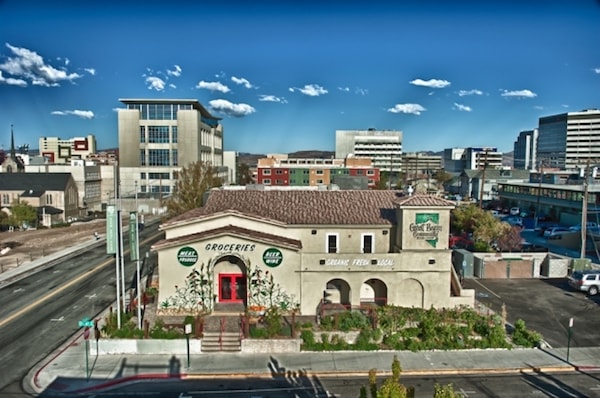Subscribe: Apple Podcasts | Spotify | Amazon Music | iHeartRadio | RSS | More
[vc_row][vc_column][vc_column_text]In Edible-Alpha® podcast #35, Tera interviews Nicole Sallaberry of Distributors of Regional & Organic Produce & Products (DROPP), a food hub that is a department the Great Basin Community Food Co-op (GBCFC) that serves the Reno, Nevada area. Nicole and her sister, Amber (now the General Manager) started the retail co-op in 2005 with the grassroots support of their community. The co-op gained 600 members within 6 months who actively shopped there and continued to work as “hands-on” owners helping to staff the store during its purely volunteer run early phase.
The co-op started as a private buying club and was initially located in the back of a punk record store, but continued to grow their sales and members. In 2008, they opened to the public in downtown Reno with 500 feet of retail space, eventually hitting $1 million in sales in one year. They had a devoted following due to being the only grocery store in that location and because they made efforts to source local food from farms that can deal with the difficult desert conditions of their area.
In 2012 they moved to another 3-story location of about 3,000 square feet (on the main floor) even closer to downtown. Though having multiple floors is a challenge, they have made it work and are building out a café on the 3rd floor. While they are tiny compared to other stores, they have space to work with and are a frequent destination for downtown shoppers looking for fresh food as well as grab and go options, which are starting to make up a bigger and bigger percentage of the store’s sales. In 2017, the store had about $4.5 million in sales after rapid growth in previous years but their growth is likely to only be incremental this year.
The GBCFC has had a board of directors from the beginning, though it started focusing more on policy governance when they moved to their current location and began hiring more paid staff. As they have grown and added employees (now they have about 40-50 employees) they have clarified board roles, the role of shared employee governance and the role of the General Manager, allowing them to focus on priorities and optimize their operations. All department managers meet weekly to discuss benchmarks and financial goals as part of their management responsibilities and so department managers can be groomed for positions of higher leadership.
Great Basin Started the DROPP food hub informally as a way to get local products into their store. The hub aggregates both local and non-local food and now has about $500,000 in sales to wholesale customers, bringing approximately $300,000 of local food into the GBCFC departments. DROPP is located in neighboring Sparks, allowing them to supply their store with local products while meeting the needs of other customers outside of their member owners (like restaurants and schools) while they build up the local food supply. Nicole said that they will consider spinning off the hub as a separate business. Nicole was inspired by the model that F.E.E.D. Sonoma is charting of a farmer-owned cooperative that generates farmer buy-in for the Hub, increasing its impact while allowing it to promote farmer and/or community ownership of micro bio-regions.
Nicole advises that the best way for aspiring co-ops to be successful is by reaching out to your community and meeting your members’ needs. She also recommends focusing on your core priorities and honing that so you don’t get off track, building capacity and buy-in with a core group of people. She has been thankful for all of the work the member owners have put in over the years as well as the mentorship and access to resources of other co-ops. The GBCFC is excited to keep supporting the local food system and community owned food.[/vc_column_text][/vc_column][/vc_row]

